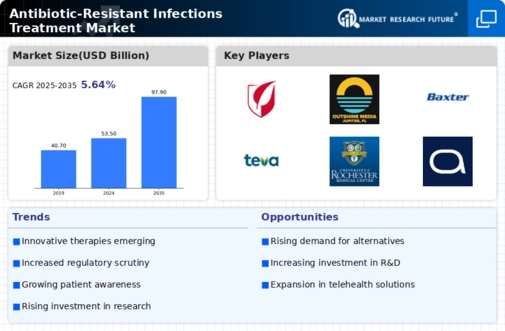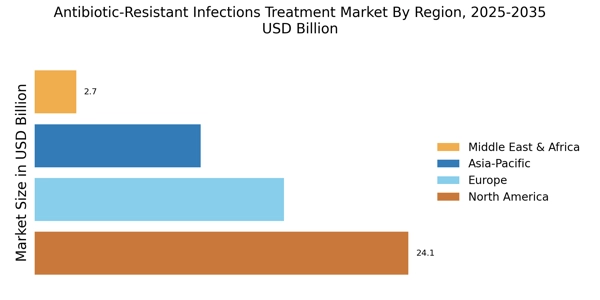Growing Awareness and Education
Growing awareness and education regarding antibiotic resistance are pivotal in shaping the Antibiotic-Resistant Infections Treatment Market. Public health campaigns aimed at educating healthcare professionals and the general population about the dangers of antibiotic misuse are gaining traction. This heightened awareness is likely to lead to more responsible prescribing practices and increased demand for effective treatment options. As healthcare providers become more informed about the implications of antibiotic resistance, they may be more inclined to seek out innovative therapies. Additionally, educational initiatives may encourage patients to advocate for better treatment options, further driving the market. The interplay between awareness and treatment demand is expected to significantly influence the Antibiotic-Resistant Infections Treatment Market.
Regulatory Support and Incentives
Regulatory support and incentives play a vital role in the Antibiotic-Resistant Infections Treatment Market. Governments and regulatory bodies are increasingly recognizing the need for new antibiotics and are implementing policies to expedite the approval process for novel therapies. Initiatives such as the Generating Antibiotic Incentives Now (GAIN) Act in certain regions provide incentives for companies to develop new antibiotics, which could lead to a more robust pipeline of treatments. This regulatory environment encourages innovation and investment in antibiotic development, which is essential for addressing the growing threat of resistance. As a result, the Antibiotic-Resistant Infections Treatment Market is likely to benefit from a more favorable regulatory landscape that promotes the introduction of new therapies.
Investment in Research and Development
Investment in research and development (R&D) is crucial for the Antibiotic-Resistant Infections Treatment Market. Pharmaceutical companies are increasingly allocating resources to discover and develop new antibiotics and alternative therapies. In recent years, R&D spending in the antibiotic sector has seen a notable increase, with estimates suggesting that it could reach billions of dollars annually. This financial commitment is driven by the urgent need to combat rising resistance rates and the potential for lucrative returns on successful drug development. Furthermore, government initiatives and grants aimed at fostering innovation in antibiotic research are likely to enhance the pipeline of new treatments, thereby propelling the Antibiotic-Resistant Infections Treatment Market forward.
Emergence of Alternative Treatment Modalities
The emergence of alternative treatment modalities is reshaping the Antibiotic-Resistant Infections Treatment Market. As traditional antibiotics become less effective, there is a growing interest in alternative therapies such as bacteriophage therapy, immunotherapy, and antimicrobial peptides. These innovative approaches offer potential solutions to combat resistant infections and are gaining traction in both research and clinical settings. The market for these alternatives is expected to expand as more studies demonstrate their efficacy and safety. Furthermore, the integration of these modalities into standard treatment protocols could significantly alter the treatment landscape, providing healthcare providers with additional tools to address antibiotic resistance. This shift towards alternative therapies is likely to drive growth in the Antibiotic-Resistant Infections Treatment Market.
Rising Incidence of Antibiotic-Resistant Infections
The increasing prevalence of antibiotic-resistant infections is a primary driver of the Antibiotic-Resistant Infections Treatment Market. Reports indicate that antibiotic resistance leads to approximately 700,000 deaths annually, a figure projected to rise significantly if no effective measures are taken. This alarming trend compels healthcare systems to seek innovative treatment options, thereby expanding the market. The World Health Organization has identified antibiotic resistance as one of the top ten global public health threats, which further emphasizes the urgency for new therapies. As resistance patterns evolve, the demand for advanced treatment modalities, including novel antibiotics and alternative therapies, is likely to surge, shaping the future landscape of the Antibiotic-Resistant Infections Treatment Market.

















